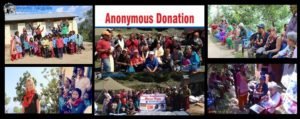
The avalanche struck around 06:45 local time (01:00 GMT) in an area known as the “popcorn field”, just above Everest base camp at 5,800m (19,000ft) which has killed at least 12 local climbers and left several others injured in what is likely to prove one of the most lethal accidents in recent history on the world’s highest peak.
Officials said 12 bodies had so far been recovered and ferried to base camp, while a further three injured climbers were being taken to Kathmandu. As many as four climbers are still thought to be missing.
An injured survivor told his relatives that the path up the mountain was unstable just before the avalanche. As soon as the avalanche hit, rescuers and climbers rushed to help.
Reports suggest a massive avalanche low on the 29,000ft (8,848m) mountain caught a work party of local sherpas as they prepared the classic South Col route – followed by the peak’s first ascensionists in 1953 – for fee-paying western climbers.
Sherpa guides had gone early in the morning to fix the ropes which will guide and safeguard hundreds of climbers, when the avalanche hit them. Reports said the accident had occurred between base camp and Camp 1 in the chaotic and extremely dangerous ice fall. The ice fall is composed of a steep glacier which fractures as it slides over cliffs, forming massive crevasses, and sherpas have to find and maintain a new route through every year.
Tourism ministry spokesman Mohan Krishna Sapkota said the climbers were all Nepalese and were preparing the route to the summit ahead of the summer climbing season which kicks off later this month.
“The sherpa guides were carrying up equipment and other necessities for climbers, when the disaster happened,” Sapkota said.
Base camp is currently crowded as peak climbing season on Everest approaches. A weather window in May allows the greatest chance of success on the mountain.
Advertisement
In recent years there has been growing controversy over the pay, conditions and safety of the local men hired for the risky job of securing the route on the mountain to allow largely western climbers on commercial expeditions charging up to $50,000 (£30,000) to reach the upper slopes of the mountain in relative security.
The Kathmandu-based climbing company Himalayan Climbing Guides Nepal confirmed that two of its guides were among the dead and four were missing.
“Six climbing guides from our company were taking up tents and supplies … two have been found dead and rescue teams are searching for the remaining four,” manager Umid Bhandari told AFP.
Eight people died on Everest last year, including one of the best-known and experienced local sherpa guides who was killed in the ice fall.
The accident will once again raise fears that the mountain is too crowded. Nepalese authorities have introduced a series of measures to reduce the number of climbers on the peak.
Last year more than 500 climbers reached the summit of Everest. On 19 May around 150 climbed the last 915m to the peak within hours of each other, causing lengthy delays as mountaineers queued to descend or ascend harder sections.
Officials have cut mountaineering fees for many other peaks while requiring each climber scaling Everest to bring back 8kg (17.6lbs) of rubbish in an attempt to clean up the “roof of the world”.
Last year officials floated the idea of installing a ladder on the famous Hillary Step, a crucial stretch of technical climbing at nearly 8,840m (29,000ft) on Everest, named after its first climber, Sir Edmund Hillary.
Though such innovations are anathema to many purist climbers, some sherpas welcome them. Entire communities in the otherwise poor Khumbu region of Nepal depend on the mountaineering industry for their livelihoods.
Relations between international climbers and sherpa guides working on the mountain are not always good. Authorities have also stationed soldiers and police at Everest base camp following a brawl between commercial climbers and Nepalese guides that year.

Khumbu Nangpala works with the motto “Breaking Down Barriers”. Keeping in line with this, Khumbu Nangpala Community Service Project (KNCSP)...
Read More